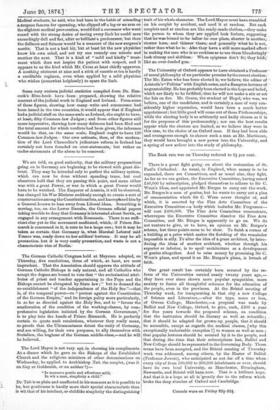One great result has certainly been secured by the re-
form of the Universities carried nearly twenty years ago,— they have ever since shown more popular sympathies, more anxiety to foster all thoughtful schemes for the education of the people, even in the provinces. At the Bristol meeting of Thursday week, for inaugurating in that city a new College of Science and Literature,—after the type, more or less, of Owens College, Manchester,—a proposal was made by Balliol and New College, Oxford, to give, each, 1300 a year for five years towards the proposed scheme, on condition that the institution should be literary as well as scientific ; that it should be adapted for grown-up people, that it should be accessible, except as regards the medical classes, [why this exceptionally undesirable exception ?] to women as well as men ; that popular lectures should be secured by it to the people, and that during the time that their subscriptions last, Balliol and New College should be represented in the Governing Body. These terms have been accepted, and the Bristol meeting of Thursday week was addressed, among others, by the Master of Balliol (Professor Jewett), who anticipated as not far off a time when every city of from 100,000 to 200,000 inhabitants or over, should have its own local University, as Manchester, Birmingham, Newcastle, and Bristol will have now. That is a brilliant hope. And that it is a hope at all is greatly due to the reform which broke the deep slumber of Oxford and Cambridge.


































 Previous page
Previous page